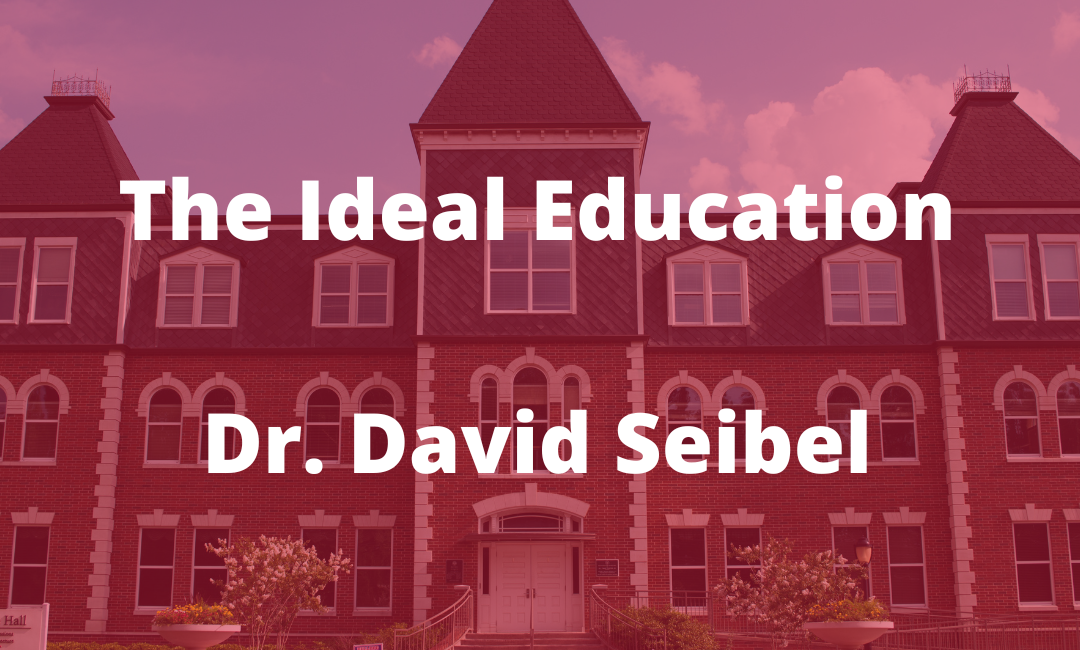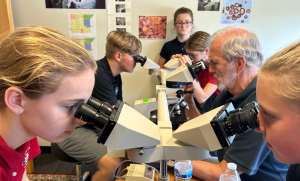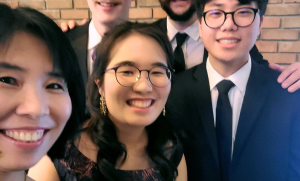by Dr. David Seibel, Head of School
This article was originally given at a Community Leaders Breakfast on February 15th, 2023.
My title today is based upon a book that I studied for my doctoral dissertation: The Ideal Executive: Why You Cannot Be One and What to Do About It. The author, Ichak Adizes, dismantles the myth of the ideal executive that we hold so dear in American corporations. The myth of the Ideal Executive is the misguided belief that a single individual is the ultimate cause of organizational growth and success. Adizes shows that an individualistic approach to leadership makes you the bottleneck. For Adizes, the ideal executive is one who sees leadership as a team sport. Adizes advocates for a unity of vision but a division of labor. I often summarize the Adizes thesis by saying,
“Diversity of background is helpful, diversity of gifting is essential, but diversity of agenda is toxic.”
– Daniel Montgomery, Leadership Mosaic 2016.
Here’s how this applies to education.
In the same way that one individual cannot do it all in a company, one idea cannot do it all within a school. Educators in America have an unbecoming habit that is always looking for the silver bullet. The single idea that offers a seemingly magical solution to the complex challenge of schooling children. We should not believe that one single idea is going to be the salvation of the next generation. Classical Christian education draws from multiple ideas across the ages.
#1 The Ideal Education maximizes traditional scholarship to foster tough-minded individuals.
In 1859, James Buchanan was president, Oregon became the 33rd US state, and John Dewey, the father of progressive education, was born. From his positions at University of Chicago and at Columbia Teachers College, John Dewey sowed intellectual weeds into American schooling that have yet to be uprooted.

For the last century, the supply lines of education have been held by progressives who are anti-intellectual and anti-curriculum. The supply lines describe the route by which soldiers receive food, equipment and weapons during a war. Our country’s supply lines are its schools.
“The philosophy of the classroom in one generation is the philosophy of the government in the next.”
– Abraham Lincoln
In order to really understand the traditional scholarship that fosters tough-minded individuals, you need this background knowledge of how John Dewey’s progressivism was the foot in the door to undo traditional scholarship.
Dewey thought that the school’s job was to teach kids how to read not what to read. He thought that Dick, Jane, and Spot could teach kids to read just as well as Shakespeare, Longfellow, and Homer.
The virus of the mind that he infected on our nation’s educators was that content should be divorced from form. He rejected that the dictum that what you teach must dictate how you teach (e.g. a math lesson and a history lesson should be taught differently). The what (curriculum) and how (methodology) were silo’d off from one another and the result was that the American public incrementally abandoned the pursuit of truth and a love of learning in favor of the pursuit of techniques and the love of learning. When you separate content from form, the result is a fragmented curriculum and a confused generation of students. Now this is not all Dewey’s fault but a father does not have some responsibility for the way his followers implemented his ideas. The American love for earning instead of learning can be traced back, at least in part, to progressive child-centered education instead of traditional content-centered education. Our focus became technique instead of truth.
Divorcing skill and content would be like teaching high school football players the skill of bench press with perfect form but with no weight on the bar. They would learn the movements but gain no muscle. This is exactly what has happened with our schools being controlled by progressive utopians for 100 years. Our kids lack the intellectual muscle needed to lift heavy ideas. Without this intellectual armor, they are especially vulnerable to sweeping ideologies.
After Dewey, the age of modernism emphasized the physical sciences as the measure of all things. Now in postmodernism, the social sciences are king because they regard man as the measure of all things. In modernism and postmodernism, there have been tremendous advances in psychology, sociology, and the physical sciences like biology and chemistry and physics. The problem is that we had to minimize traditional scholarship in order to achieve these contemporary scientific and social scientific ends. Our problem in American education has always been that our priorities get out of order.

Progressivism focuses on skills and job training. This is not to say that vocational and technical training are wrong, but it is to understand the difference between K-12 schooling and lifelong education. Schooling is for the young. Education comes later, usually much later. The very best thing for our schools to do is to prepare the young for continued learning in later life by giving them the skills to learn and to love learning. Kids have their whole lives to get trained for the many jobs that they’ll have. How would we prepare kids for jobs that don’t yet exist anyways? You give them range through traditional scholarship.
The opposite of progressivism would be traditionalism, or classicism, where the emphasis is on that which is unchanging. Traditional scholarship is the focus of classical Christian education because we want to introduce students to what is known as the great conversation. This is the intergenerational interaction of the ideas that have stood the test of time in all fields of knowledge ranging from history and literature to math and science. Instead of being centered on the child’s desires, it is focused on the truth. Instead of being guided by certain abstract skills, it is oriented around content, and students are handed the tools of learning in order to interact with the content.
The ideal education works with the grain of the child in their dignity, but seeks to sand away their depravity by God’s grace. This methodology is known as classical Christian education and it takes the best of progressivism and the best of traditionalism to help children reach their full potential. The ideal education takes the best from a diversity of ideologies. We agree with progressives that unbolting the desks from the floor was wise, but we disagree that the curriculum needed to be unbolted from historic Christian truths that Western Civilization had believed for centuries. Traditional scholarship at CDA occurs in three stages (grammar K-6, Logic 7-9, Rhetoric 10-12)
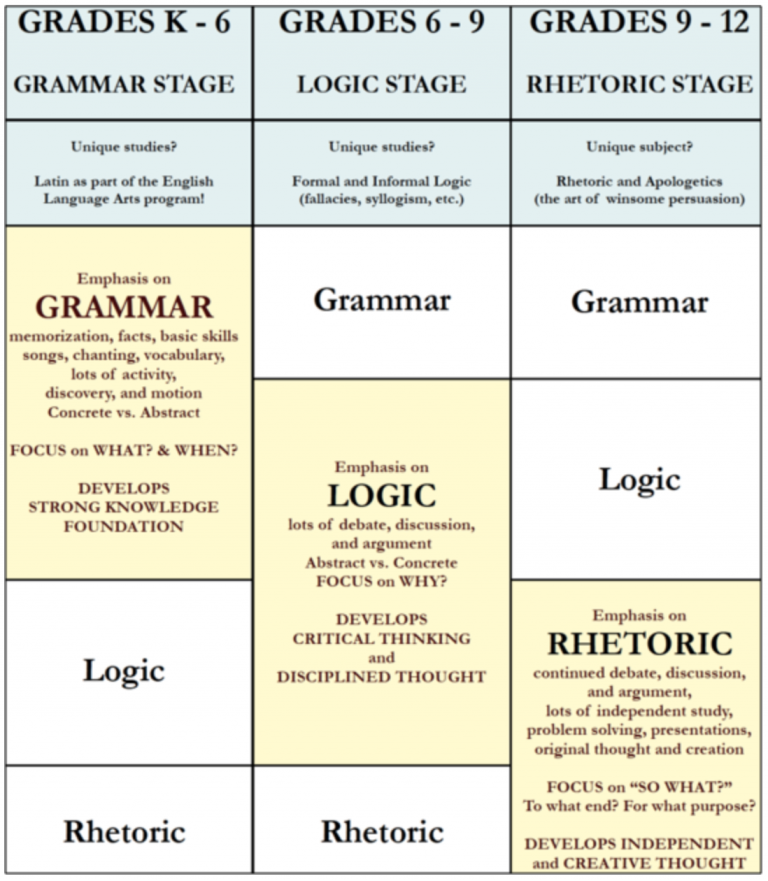
- The foundational stage of the learning lifecycle is the grammar stage. This is the ‘what’ of education and we fill students with the seeds of learning by memorizing bible verses and poetry and singing songs.
- The second stage of the learning lifecycle is the logic stage and is the ‘why’ of education. Students at this stage are more prone to resisting the authority of teachers and parents and ask ‘why’ in this stage of the lifecycle. Because new challenged are needed, formal and informal logic are introduced into the student’s curriculum.
- In the teenage years, students begin to blossom in the rhetoric stage (high school). We focus on the ‘how’ applications of their learning in this stage of the learning lifecycle. We are primarily discussion centered which means Chat GPT will not really help when the teacher asks the student to their face the meaning of Rouseeau’s quote, “Man is born free and everywhere he is in chains.”
The battle for the American mind is not in colleges, but in kindergartens.
– David Goodwin, 2022
We might not be looking for war but war is looking for the next generation. Human minds are made to feed on knowledge and idea-lite schools will be taken captive by new and foreign ideas. You see this in the war on merit where equity has overtaken excellence. Here is one example – For years, two administrators at Thomas Jefferson High School for Science and Technology (TJ) have been withholding notifications of National Merit awards from the school’s families, most of them Asian, thus denying students the right to use those awards to boost their college-admission prospects and earn scholarships. This episode has emerged amid the school district’s new strategy of “equal outcomes for every student, without exception.” School administrators, for instance, have implemented an “equitable grading” policy that eliminates zeros, gives students a grade of 50 percent just for showing up, and assigns a cryptic code of “NTI” for assignments not turned in. It’s a race to the bottom.
The war on merit is most evident in higher edu. Right now, the number of diversity, equity, and inclusion officers exceeds the total number of history professors. No wonder enrollment is down by 13% in higher education and homeschooling has increased by 10x in less than 10 years.
An ideal education produces exceptional results because it has low walls of separation between the disciplines of knowledge. The mathematician can reach across the wall of his neighboring theologian shake hands in fellowship. The same can happen with the athletes and the artists, the poets and the engineers.
So let’s get into the second of these three ideas of an ideal education.
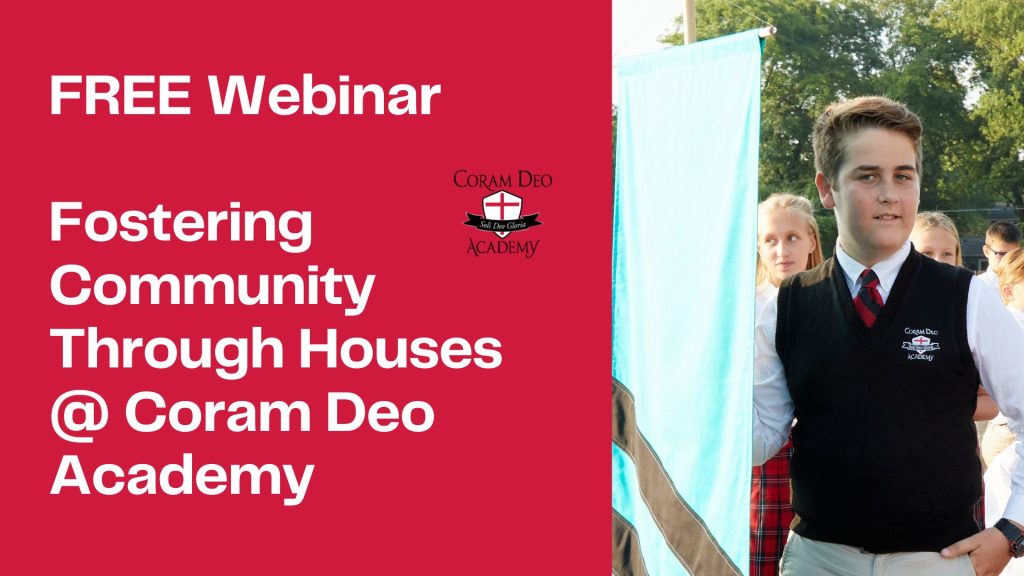
#2 The Ideal Education synthesizes Christian discipleship to cultivate tender-hearted communities.
In the same way that the single parent home is not ideal, neither is the single idea education ideal. We need both scholarship and discipleship. A healthy school has room for logic, imagination, poetry, physics, tough minds, and tender hearts. To be an education full of grace and truth, we need the tough minds to be connected to a tender heart. Traditional scholarship was not able to anticipate and avoid certain pitfalls and faced a founder’s dilemma in our country. A founder’s dilemma is a business term for when the creative ideas that accelerated a movement become impediments at the next stage of development. The Founder’s dilemma is why father-son business hand-offs typically fail. The son does not have sweat equity and does not understand what it took to build the business.The father is unable to appreciate the complementary gifts of his son, so he never really trained him up to run the family business. During a founder’s dilemma, the newer group usually incites a revolution against the standing group (e.g. American Revolution, French Revolution).
Dysfunctional relationships are ones where you only see the worst in the other person. I think this is what has happened to education across the generations in America — especially between the progressives and the traditional classicists– Christianity is able to synthesize the best of these views into an approach that strengthens kids. The founders of our country were more Enlightenment rationalists than they were sentimental romantics. They really put facts over feelings. Thus, the more romantic educational reformers later revolted against their rationalist forebears, because they saw themselves as the true nurturers of the next generation.
The traditional educational views always get challenged by the younger, more progressive, generation. The US went from from a predominantly rural country of 76.2 million persons in 1900, to a mostly urban-suburban population totaling 281.4 million in 2000. The U.S. more than tripled in population size over the course of the 20th century. Traditional scholarship was swept under the rug as treating children as brains on a stick rather than humans with head, heart, and hands. But classical Christian education is making a huge come back. This is because honest people know we’ve become disconnected from our shared ideals. CDA enrollment has doubled over the past two years. Hillsdale College has received record high applications. Classical Academic Press, a producer of classical Christian curriculum, had an 83% increase in business in 2022.
You don’t have to choose between discipleship and scholarship, much like you don’t have to choose between walking on your right leg or left leg. Scholarship without discipleship makes a child a clever devil whereas scholarship without discipleship makes them a pious ignoramus. In the first section, I shared that we lost our mind by rejecting intellectual content. In this second section, I want to say that we lost our heart by letting scholarship get divorced from discipleship. When Dewey began to divorce content from skill, he severed the heart from the head.
But things have not always been compartmentalized this way.
Harvard College in 1646 had this as their founding mission,
“Every one shall consider the main end of his life and studies to know God and Jesus Christ which is eternal life.”
Just over half of the graduates in the 17th century became clergy. But Harvard is now pursuing different ideals along with most of higher education. Yale Professor William Sumner in June 1881 describes well what happened to the spiritual heart and soul of American education.
“Four or five years ago my studies led me to the conviction that sociology was about to do for the social sciences what the scientific method has done for natural and physical sciences— rescue them from arbitrary dogmatism and confusion… I never consciously gave up a religious belief. It was as if I had put my beliefs into a drawer, and when I opened it, there was nothing there at all.”
Religion in American education was not killed in a great white shark attack but it was nibbled to death by minnows. People often point back to the abandonment of the Bible and prayer in the mid 20th century but the issue really goes back Dewey and his divorcing of form from content.
So Ideal #2: Classical Christian education synthesizes Christian discipleship to cultivate tender-hearted communities. CS Lewis wrote,
“I believe in Christianity as I believe that the sun has risen: not only because I see it, but because by it I see everything else.”
If Christ is Lord at all, he must be Lord of all including Logic, Latin, and Science. We may have won the Bible in previous ages but we are losing the war for the dictionary. When scholarship and discipleship are combined, you care about both.

The round table, instead of the desk bolted to the floor, is our key learning arrangement in upper school because it allows for discussion centered socratic seminars. We totally reject the fundamentalist withdrawal from culture you see in some aspects of Christian education. We don’t want to be in a castle with a mote surrounding the Academy, but want to be like a greenhouse that will grow them up to be transplanted to grow in the world at the right time. We like round-tables in Upper School because it creates tough minded individuals and a tender-hearted community. As Frederick Douglas once wrote,
“It is easier to build strong children than repair broken men.”
This tendency for Christians to withdraw from culture into schools has a history in Christian education in our country. After Brown vs. Board of Education (1954) when schools were integrated, many concerned Christian parents moved their families to the suburbs and began schools in the late 1950s and 1960s. The problem is that many of them were fundamentalists that emphasized separation from the world, but did not have their own positive vision of education. It was all about withdrawal from the world. They were fundamentalists. These schools’ cultures were known for what they rejected more than what they affirmed.
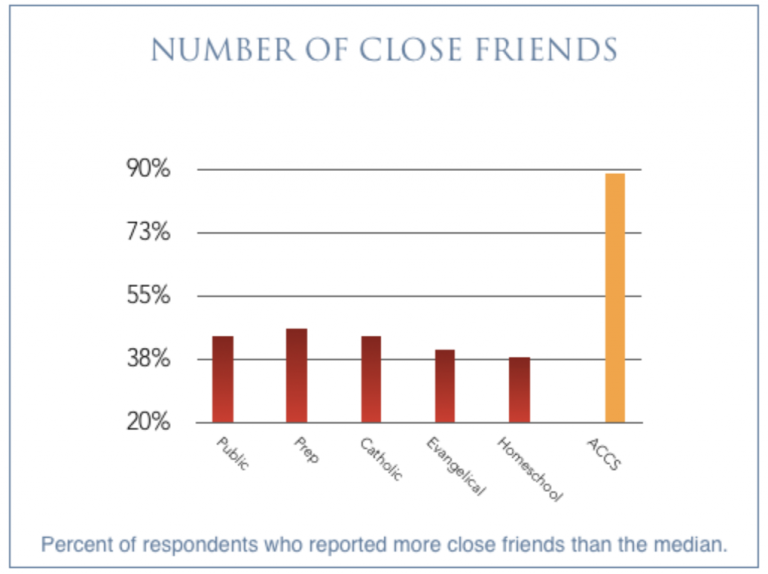
This combination of discipleship and scholarship has been validated by a study conducted by Notre Dame in 2019. The study was commissioned because classical Christian school alumni had already been shown to do far better on the SAT and ACT, but supporters of the movement wanted to see its impact on life outcomes. Notre Dame completed a comparative study in 2018-19 of 24-42 year old alumni from public, secular private, Catholic, evangelical Christian, religious homeschool, and ACCS (classical Christian) schools. The topics consisted of life-choices, preparation, attitudes, values, opinions, and practices. This research seems to confirm what history has repeatedly demonstrated—classical Christian education can influence the course of a home, a community, or a nation.
#3 The Ideal Education minimizes institutional administration to organize strong-boned institutions.
Thus far, I have talked about the head and the heart of an ideal education. Now it is time to talk about the bones. When an organization lacks structure and organization, it will likely exhibit arrested development. In public education, the government has been in charge of the centralization, standardization, and administration of education. However, this has produced a crisis of autonomy as of late. Autonomy is just self government. The autonomy crisis is evident in the rise of homeschooling and the massive exodus from public schools during covid into private schools.
When organizations grow, they get more boney and impersonal unless they fight to protect the tough minds tender hearts. An operations manual can be used in a dehumanizing way or it can be used for good things like culture building. An operations manual and a training program is why they give my daughter flowers at Trader Joes. It is also why they say my pleasure at Chick-Fil-A. The reality is that schools often lose some flexibility as they become more muscle bound organizationally. As this happens, schools still need to fight against becoming bureaucratic or aristocratic. The bones cannot be so brittle and inflexible that they cannot obey the commands of the mind or the longings of the heart.

In the early 1900s, folks like Carnegie and Rockefeller waged war on traditional scholarship and Christian discipleship. They did not see why taxpayers’ money was going to learning Latin and Greek, and reading Homer and Shakespeare. These men had tremendous influence on how superintendents showed up at work throughout the 20th century. Andrew Carnegie once said,
“To learn Latin and Greek is to waste energies… this learning gives students a distaste for practical life… young men intended for business are damaged by these studies… classical learning stamps the fire and energy out of them.”
Carnegie gave millions of dollars to schools on one condition – that they were not religiously affiliated. The result was that most schools broke ties from churches in reverence to the almighty dollar. In the 1900s, school boards became populated by businessmen who had little patience for statesmen, scholars, and philosophers; they wanted superintendents who were business managers who could keep costs down and efficiently organize the students.
Whether public or private or homeschool, the bottom line is never finances or enrollment or facilities – but student transformation. One classically-minded school leader said,
“The greatest danger that besets superintendents at the present time is that they will become merely business managers.”

We need both the trellis and the vine to offer the ideal education to the next generation. We need the head, the heart, and the bones to work together. In 1 Corinthians 12:21, Paul writes,
“The eye cannot say to the hand, I have no need of you.”
We need many members working together as part of one body—the discipleship, the scholarship, and the institutional administration. For if we only have a heart, where will the sense of hearing be. We want to give our children something we ourselves did not receive – tough minds, tender hearts, and strong bones.
Leaders in admin ignored the substance of education (the content) and had centered their attention on the mechanics of admin— they knew the price of everything, and the value of nothing. They were not equipped to answer any of the basic questions about education because they had been through an empire of professional courses on a foundation of sand.


